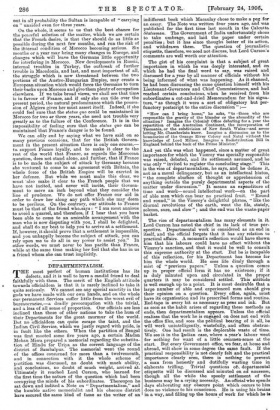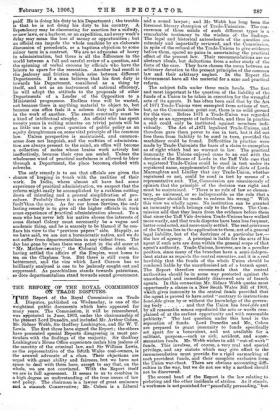DEPARTMENTALISM. T HE most perfect of human institutions has its defects,
and it is well to have a candid friend to deal faithfully with them. The merit of the English attitude • towards officialdom is that it is rarely inclined to take it quite seriously. We cannot see any special sanctity in the gods we have made with our own hands, and on the whole our, permanent Services suffer little from the worst evil of bnreaucracies,—a deadly preoccupation with the trivial, and a loss of all sense of proportion. Our officials are less inclined than those of other nations to take the hum of their Departments for the great murmur of the world. But no officialdom can quite escape the taint, and the Indian Civil Service, which we justly regard with pride, is in fault like the others. When the partition of Bengal was first mooted some five years ago, a certain Madan Mohan Misra prepared a memorial regarding the substitu- tion of Hindu for Uriya as the correct language of the district of Sambalpur. The memorial went the round of the offices concerned for more than a twelvemonth, and in connection with it the whole scheme of partition was discussed, no doubt with much ability, and conclusions, no doubt of much weight, arrived at. Ultimately it reached Lord Curzon, who learned for the first time the nature of the question which had been occupying the minds of his subordinates. Thereupon he sat down and indited a Note on " Departmentalism," and the humble native memorialist and his obscure district have secured the same kind of fame as the writer of an indifferent book which Macaulay chose to make a peg for an essay. The Note was written four years ago, and was published for the first time last month in the Calcutta Staterman. The Government of India unfortunately chose to take umbrage, and laid the paper under certain penalties ; but it has since thought better of its action, and withdrawn them. The question of journalistic etiquette, therefore, we need not discuss, but Lord Curzon's comments are well worth our attention.
The gist of his complaint is that a subject of great importance in which he was deeply interested, and on which he had the final word to say, was raised and discussed for a year by all manner of officials without his being informed of what was happening. As it chanced, he had been discussing the same question himself with his Lieutenant-Governors and Chief Commissioners, and had reached certain conclusions, when he received from his subordinates a cut-and-dried Memorandum for his signa- ture, "as though it were a sort of obligatory but per- functory postscript to the entire discuiiiion :— "How can I bring home," he asks, "to those who are responsible the gravity of the blunder or the absurdity of the situation ? Imagine the Colonial' Office debating for a year the repartition of the Australian Continent, the incorporation of Tasmania, or the subdivision of New South Wales—and never letting Mr. Chamberlain know. Imagine a discussion as to the boundaries of the Orange River Colony and Natal without the knowledge of Lord Milner. Imagine a Redistribution Bill in England behind the back of the Prime Minister."
And yet this was what happened, since a matter of great importance for which the Viceroy was specially responsible was raised, debated, and its settlement assumed, and he was only "invited to register the concluding stage." This is the vice of departmentalism, he says, and he defines it, not as a moral delinquency, but as an intellectual hiatus, "the complete abseiice of thought or apprehension of anything outside the purely departmental aspects of the matter under discussion." It means an expenditure of time and work—sound intellectual work—on the part of able men which can bear no practical fruit. "Round and round," in the Viceroy's delightful phrase, "like the diurnal revolutions of the earth, went the file, stately, solemn, sure, and slow "; and the end was the waste-paper basket.
The vice of departmeotalism has many elements in it. Lord Curzon has noted the chief in its lack of true per- spective. Departmental work is considered as an end in itself, and the official forgets that it has any relation te practical affairs. A moment's reflection would have thown him that his labours could have no effect without the Viceroy's sanction, and that it would be well to consult this supreme authority at the start. But he is incapable of this reflection, for his Department has become for him the whole world. He sees life dimly through a mist o "previous papers." Unless a question comes up in proper official form it has no existence ; if it is duly minuted upon and circulated in the proper quarters it may be considered settled. This attitude is well enough up to a point. It is most desirable that a large number of able and experienced men should give their opinion on a question. Every office, again, must have its organisation and its prescribed forms and routine. Red-tape is every bit as necessary as pens and ink. But as soon as the habit arises of regarding these methods as ends, then departnaentalism appears. Unless the official realises that the work he is engaged on does not end with the office files, and sees the political bearing of it all, he will work unintelligently, wastefully, and often obstruc- tively. One bad result is the deplorable waste of time We see it in the Indian case, where a year's labour went for nothing for want of a little common-sense at the start. But every Government office, we fear, at home and abroad, will show in some degree the same fault. If the practical responsibility is not clearly felt and the practical importance clearly seen, there is nothing to prevent a man from honestly and dutifully wasting time in elaborate trifling. Trivial questions of\ departmental etiquette will be discussed and minuted on ad nauseam4 though all the while the speedy settlement of the business may be a crying necessity. An official who spends days elaborating any obscure point which occurs to him does no violence to his conscience. Zfe is using his brains in a way, and filling up the hours of work for which he is. paid! He is doing his duty to his Department ; the trouble Is that he is not doing his duty to his ceuntry. A &pendency may be clamouring for sanction for a railwity, or new laws, or a harbour, or an expedition, and every week's delay may mean the loss of money or opportunities ; but an Official can impede the whole machine by an elaborate • discussion of precedents, or a baptious objection to some minor -term in a contract. We are no advocates of hurry in administration, but there is all the difference in the world between a full and careful review of a question, and the spinning of verbal cocoons by officials who have the leisure to spare for the recreation. Another bad result is the jealousy and friction which arise between different Departments. If a man believes that his first duty is towards his Department, considered as a thing by itself, and . not as an instrument of national efficiency, be will adopt the attitude to the proposals of other 'Departments of a Leader of the Opposition to a Ministerial programme. Endless time will be wasted, not because there is anything material to object to, but because one office feels it a solemn duty to pick holes in the work of another. The result eventually must be a kind of intellectual atrophy. An official who has spent twenty years in writing minutes on trivial points will be as little use in a great question of public policy as an equity draughtsman on some vital principle of the common law. Unless perspective is maintained, and common- sense does not languish, and the realities of administra- tion are always present to the mind, an office will become a collection of moles whose brains work actively but ineffectively, because their eyes are sealed. "Unless the wholesome wind of practical usefulness is allowed to blow through a Department, the place become % choked with cobwebs.
The only remedy is to see that officials are given the chance of keeping in touch with the realities of their work. In India, where almost all have had some experience of praatical administration, we suspect that the reform might easily be accomplished by a ruthless cutting down Of rainuting and a general simplification of pro- cedure. Probably there it is rather the system that is at laulethan the men. As for our home Services, the only laking remedy is te. give all the higher officials in turn some experience of practical administration abroad. To a man who has never left his native shores the interests of some distant Colony must necessarily be a vague and academic thing, and he is scarcely to be blamed if he con- fines his view to the "previous papers" side. Happily, as we have said, we are not a bureaucratic nation, and we do not suffer from departmentalism in any violent form. The day has gone by when there was point in the old sneer at "Mr. Mother-ceuetry," the Polonial Office clerk who, having settled the affairs 6f the Empire, went home to tea on the Clapham 'bus. But there is still room for betterment, and the vice which Lord Curzon has so brilliantly analysed is one to be jealously sought out and. suppressed. As parochialism stands towards patriotism, so does departmentalism stand towards sound government.











































 Previous page
Previous page